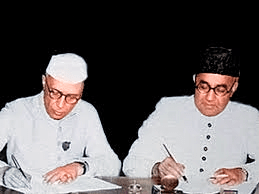At the time of independence, many communal riots broke out in different areas of India and Pakistan. These riots had a great impact on the status of minorities in the two nations. Due to brutal killings by the majority community, a huge number of Muslims migrated from India, and Hindus and Sikhs from Pakistan. Yet, the mass migration failed to solve the minority problem. Even after the migration, almost half of the Muslims living in the Sub-continent were left in India and a sizable number of Hindus in Pakistan. Those who were left behind were unable to become an integral part of the societies they were living in. The people and government of their countries looked upon them as suspects. They were unable to assure their countrymen of their loyalty.
This problem escalated during the late 40’s and early 50’s. It seemed as if India and Pakistan were about to fight their second war in the first three years of their independence. At this critical juncture in the history of South Asia, Prime Minister of Pakistan, Liaquat Ali Khan issued a statement emphasizing the need to reach a solution to the problem. He also proposed a meeting with his Indian counterpart to determine how to put an end to the communal riots and the fear of war.
The two Prime Ministers met in Delhi on April 2, 1950, and discussed the matter in detail. The meeting lasted for six long days. On April 8, the two leaders signed an agreement, which was later entitled as Liaquat-Nehru Pact. This pact provided a ‘bill of rights’ for the minorities of India and Pakistan. Its aim was to address the following three issues:
- To alleviate the fears of the religious minorities on both sides.
- To elevate communal peace.
- To create an atmosphere in which the two countries could resolve their other differences.
According to the agreement, the governments of India and Pakistan solemnly agreed that each shall ensure, to the minorities throughout its territories, complete equality of citizenship, irrespective of religion; a full sense of security in respect of life, culture, property and personal honor.
It also guaranteed fundamental human rights of the minorities, such as freedom of movement, speech, occupation and worship. The pact also provided for the minorities to participate in the public life of their country, to hold political or other offices and to serve in their country’s civil and armed forces.
The Liaquat-Nehru Pact provided for the mechanism to deal with oppressive elements with an iron hand. Both the governments decided to set up minority commissions in their countries with the aim of observing and reporting on the implementation of the pact, to ensure that no one breaches the pact and to make recommendations to guarantee its enforcement. Both Minority Commissions were to be headed by a provincial minister and were to have Hindu and Muslim members among its ranks. India and Pakistan also agreed to include representatives of the minority community in the cabinet of the two Bengals, and decided to depute two central ministers, one from each government, to remain in the affected areas for such period as might be necessary. Both the leaders emphasized that the loyalty of the minorities should be reserved for the state in which they were living and for the solution of their problems they should look forward to the government of the country they were living in.
This pact was broadly acknowledged as an optimistic beginning to improve relations between India and Pakistan.
This article was last updated on Sunday, June 01, 2003






